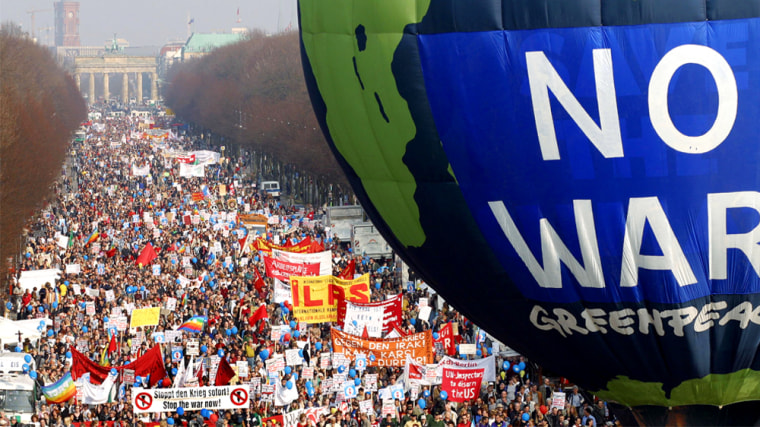Years ago, the comedian John Cleese, playing the role of the misanthropic provincial English inn keeper Basil Fawlty, finds himself hosting a family of German tourists. To ensure nothing goes wrong, he admonishes the staff: “Whatever you do, don’t mention the war.” Fawlty fails miserably to practice what he preached, and the results are hilarious to everyone involved -- everyone, of course, except the Germans.
An American in Germany right now might sympathize a bit with Basil’s hapless guests.
“We’ve gone from the lighthouse on the hill to an image of an aggressive imperial force that wants to control the world that uses everything from ICBMs to Starbucks coffee to get people to tow the line,” says John Kornblum, a former American assistant secretary of state who now heads the Berlin office of the international investment bank Lazard. “Our brand is very damaged, more damaged that I ever thought it would be.”
Christian Hingst, who works as a speechwriter for Germany’s health minister, says he views America differently in the wake the Iraq crisis.
“I think our reaction is natural,” he says. “Many of us don’t accept the American way of doing this, that you ask the world’s opinion and when you get an answer you don’t like, you say ‘to hell with the world.’ I think we trust America less now.”
Not your father's Germany
For Kornblum and other Americans gained their knowledge of Europe during the decades after World War II, the idea that the split over Iraq might herald some permanant shift is hard to compute. A generation of American businessmen, politicians, students and journalists, not to mention the millions of GIs who did their stints on U.S. bases here, enjoyed formative experiences in Germany and proudly cite its rebirth as a vital democracy as one of the great American achievements of the 20th century.
On the surface, little has changed. American and German tourists continue to cross the Atlantic, as do investment dollars. According to the German-American Chamber of Commerce, some 600,000 American jobs are tied to German investment in the states, and another 500,000 in Germany directly flow from U.S. investment here.
Indeed, some 2,000 German soldiers patrol parts of Afghanistan and Germany is joint commander of the growing NATO force that is stabilizing the country following the U.S.-led operation there in 2001. And last week, Germany’s Chancellor Gerhard Schroeder, whose vocal opposition to U.S. plans in Iraq is credited with getting him reelected last year, told reporters German air force planes would be available to evacuate the wounded from Iraq.
This has led many to suggest that the Iraq split was just a passing storm – in Secretary of State Colin Powell’s words, “differences between friends.”
A breach of faith
But many in Europe viewed the paternalistic tone of the American side of the Iraq debate as a wake up call. In this view, America's "arrogance" will only accelerate the process of building a separate European super-state, complete with its own coherent foreign policy and military forces – not necessarily working in concert with Washington. European experts warn against assuming that the new spirit of cooperation adopted by France and Germany at the U.N. and elsewhere means a return to business as usual.
“Many thought (U.S. Defense Secretary Donald) Rumsfeld was not serious when he made that “old Europe” crack,” says Jens van Scherpenberg, an expert on U.S. policy at the German Institute for International and Security Studies in Berlin. “But the point about this old Europe and new Europe is that he really hit a raw nerve. People here said, 'so, that’s what the game is? Divide Europe, torpedo and sabotage it by encouraging the Poles or the Spanish or the Italians to play a destructive role'.”

This was not merely confined to the Iraq debate. Poland, Spain, Italy, along with Britain, Denmark, the Netherlands and a host of smaller “new democracies” in eastern Europe, did support the American position.
But European politicians took a dimmer view of what happened after the war during a crucial European Union summit in December when the EU was to have adopted a new constitution cementing together the dream of a more federalist structure, complete with a serious new push to build a European military force and coordinate foreign policy. At that meeting, Poland and Spain refused to stick to the script largely written in Berlin and Paris. The summit collapsed in disarray. To some, the debacle seemed to have American fingerprints all over it.
“For the first time since World War II, you have powerful individuals in office in Washington who are no longer in support of European unity,” says Charles Kupchan, an American specialist on Europe and Georgetown University professor. “I don’t know that Washington explicitly interfered in the EU constitutional debate, but certainly there was some glee among Bush officials that Europe stumbled.”
History lesson
The importance Germans place on European integration in Germany is not fully understood in the United States. Like all European countries, there are a good number of Germans suspicious of the ever growing bureaucracy based in Brussels. But for historical reasons, the EU is viewed as an acceptable way for Germans to exercise power, something their own history – and decades of American tutelage – have warned them against. For America now to oppose European unity strikes Germany as an unacceptably selfish reversal of Washington’s own post-war mantra.
“This is not something that is going to go away in a year, or even after Bush leaves office,” says Kornblum, who also served as U.S. ambassador to Germany and to NATO during his 20-year State Department career. “You can point back to many times in the past, like the Suez crisis, the French pulling out of NATO’s military command, the anger over Pershing missiles that America put in Europe in the '80s, and you can say, ‘this too will pass’. Those events came at a time when the world was frozen. Today, you have a Europe free of empires for first time in history, and so when it detects a new one rising to dominate it – an American one – the reaction is severe. [Americans] keep looking at Europe as if it is a fixed situation. It is not. It is a dynamic, growing social experiment, and we need to understand that increasingly it will say ‘No’ to American ideas.”
Relevance and trust
So what has changed, and what does it mean for U.S. relations with Germany and with Europe as a whole?
To those in the Bush administration who regard themselves as “neo-conservatives,” the main thing that changed is Washington’s willingness to tolerate Europe’s sense of self-importance.
“During the 1990s, when military operations mostly were about stopping conflicts in failed states, it made a lot of sense to build coalitions and make sure the U.S. and Europe were on the same page,” says a senior defense department official, who requested anonymity. “But September 11 changes the game. Now it’s a war, and we’re in the trenches. And when you see something coming at you, you don’t wait around for the fat lazy kid at the back to decide to go over the top. You move now and take questions later.”
It is precisely this kind of rhetoric – softened only a bit when administration officials are on camera – that has rankled Europe so.
“You could argue it is better to fight a preventive war than waiting, and we understand that,” says Hanjo Hellmann, a microbiologist at the Free University of Berlin who has studied in the United States and travels back often to visit his American girlfriend. “But the question is why America fought in Iraq. Was it really about human rights, which is what they’re trying to say now. Or was it really all about oil and about correcting the mistakes of Bush’s father. That’s what really bothered us. That, and the sense that America was saying, ‘you don’t even have a right to an opinion’.”
Coming Tuesday: The feisty Poles
